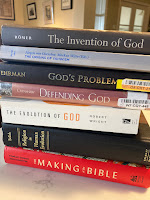Yahweh, the God of Abraham, Isaac, and Jacob never was.
That is, Yahweh wasn’t what I was brought up to believe or what I was taught in seminary. In this post I will explain why he never was and I will ask what that might mean for modern faith.
What I learned as a child was that God appeared to Moses at a burning bush, and said his name was “Yahweh.” He had showed up earlier in the Bible, of course. But the people of Israel, stuck in slavery, had either forgotten God’s name, or forgotten God altogether. Moses was a new beginning.
 |
| William Blake: "The Ancient of Days." 1794 |
What I learned in seminary was that there were several strands of oral and/or written tradition in the Old Testament (the JEDP theory) masterfully woven together by an editor or two. Be that as it may, the stories found in the Old Testament—perhaps with the exception of Genesis 1-11—pretty much happened as recorded. This was so because the Bible was thought to be God’s inspired, infallible word.
What I’ve learned since then is that there are many clues within scripture itself, and some others from archeological studies, that suggest the Old Testament contains very little of what we would call history, and nothing like a straightforward revelation of who Yahweh (or El, one of God’s other many names) is.
Contemporary scholars believe that for most of Israel’s history, right up to Judah’s exile in 597 BC, Yahweh was one of several God’s worshipped in the temple, albeit he was also conceived of as Israel’s personal, national God. He had a consort, too, the goddess Asherah, whose statue was also found in the temples of Jerusalem and Samaria.
These same scholars argue about when and how Israel and Judah settled on Yahweh as their national God, an equal to the national Gods of the surrounding nations. Some (perhaps most) think that Yahweh was a tribal God for people in the South—Midianites, Edomites, or Kennites. Others think that Yahweh is the Israelite name given to Israel’s version of Baal, the storm God.
The view that the Israelites worshipped many Gods for most of their history, but they finally adopted one of them as their favorite “national” God is called monolatry. When both Israel and Judah went into exile, their temples in Samaria and Jerusalem destroyed, religious leaders looked for a way to explain things. The did so by anchoring Israel’s religious beliefs not in a place—the temple—but in a book, the law. The story of how the law came to be is the near final edit of all the Bible’s material--now usually called the Deuteronomist source. This edit shaped much of the Hebrew Bible to agree with the new view, although discerning readers can find many traces of the older, monolatrous views in scripture as well.
The move of Israel’s religious and ethnic self-understanding to the law allowed the Hebrew Bible’s final editors to argue that it was Israel’s purported refusal to keep the law that resulted in the one and only God Yahweh to use foreigners such as the Babylonians and Assyrians to punish Israel. God could do so because he actually was the one and only and almighty God.
In this short space I cannot make a detailed defense of these sort of claims. However, at the end of this post, I’ve listed a half dozen great resources that explain this scholarship in depth.
I think, though, that Evangelicals who hold to the inspiration of scripture, and its basic factual correctness, have to stop dealing with modern scholarship by hiding behind this doctrine as a way of avoiding or rejecting such scholarship. It is shocking how few evangelical journals even review this sort of contemporary scholarship. I think that if Evangelicals want to argue for something like divine inspiration, they will have to show that such inspiration is still plausible given what we now know about both scriptures and Israel’s history.
The deeper question that all this raises for me, however, is this. Given that we can recreate the story of how Judaism evolved from following many gods to a monolatrous to a monotheistic religion over the course of six or seven hundred years, can we really know anything about who Yahweh really is, if he or she is at all?
Perhaps not. Perhaps all we can say is what an interesting story this is—like the Atrahasis Epic, or the Gilgamesh Epic, or the Beowulf epic are interesting.
Or, we might say that what really matters here is how the values and hopes and dreams of Israel shaped the story which in turn still shapes Judaism, Christianity, and Islam. These values continue to play a critical role in our present time.
Or, we might say that whatever the history of how Yahweh came to be the (related but quite different) Gods of Judaism, Christianity, and Islam, what really matters is that Yahweh somehow shaped that evolution, so that where the Bible ends up is the picture an actual Yahweh wants us to invest in. Some versions of this view are labeled “progressive revelation.”
Personally, on most days, I am a theist. But the truth is, we—or Buddhists or Muslims or Animists—we all get about as much about God as we get about the algorithms that shape our web searches. Whoever or whatever God is, he or she or it is hard to find.
After all, as Isaiah puts it, “Truly, you are a God who hides himself” (45:15).
Bibliography: Robert Bellah, “Religion in Human Evolution.” James Kugel, “The Great Shift: Encountering God in Biblical Times.” Jurgen van Oorschot and Markus Witte (Eds), “The Origins of Yahwism.” Thomas Römer, “The Invention of God;” Konrad Schmid and Jens Schröter, “The Making of the Bible: From the First Fragments to Sacred Scripture.” Franceseca Stavrakopoulou, “God: An Anatomy.” Karel Vander Toorn, “Scribal Culture.”
